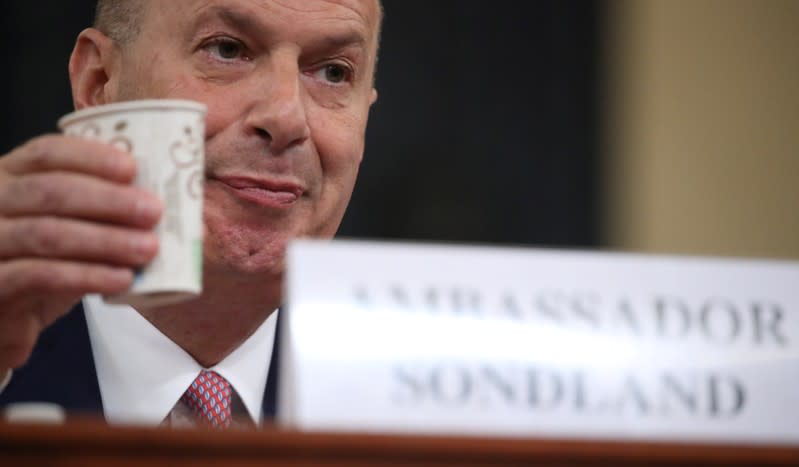'Everyone was in the loop': Highlights from Sondland testimony

WASHINGTON (Reuters) - The U.S. House of Representatives Intelligence Committee, which is leading an impeachment inquiry https://www.reuters.com/article/us-usa-trump-impeachment-testimony/u-s-ambassador-sondland-says-he-followed-trumps-orders-on-ukraine-idUSKBN1XU1S3 into President Donald Trump's dealings with Ukraine, held a fourth day of public hearings on Wednesday.
The following are select excerpts from the prepared remarks of the first witness, Gordon Sondland, U.S. ambassador to the European Union, who is considered a key figure in the Democratic-led probe:
GORDON SONDLAND, U.S. AMBASSADOR TO THE EUROPEAN UNION:
"Was there a quid pro quo? As I testified previously, with regard to the requested White House call and White House meeting, the answer is yes."
"My memory has not been perfect. And I have no doubt that a more fair, open, and orderly process of allowing me to read the State Department records would have made this process more transparent."
"Secretary (Rick) Perry, Ambassador (Kurt) Volker and I worked with Mr. Rudy Giuliani on Ukraine matters at the express direction of the president of the United States. We did not want to work with Mr. Giuliani. Simply put, we played the hand we were dealt. We all understood that if we refused to work with Mr. Giuliani, we would lose an important opportunity to cement relations between the United States and Ukraine. So we followed the president's orders."
"Everyone was in the loop. It was no secret."
"We kept the leadership of the State Department and the (White House National Security Council) informed of our activities. That included communications with Secretary of State (Mike) Pompeo, his counsellor Ulrich Brechbuehl and executive secretary Lisa Kenna with the State Department; and communications with Ambassador John Bolton, Dr Fiona Hill, Mr Timothy Morrison and their staff at the NSC. They knew what we were doing and why."
"The suggestion that we were engaged in some irregular or rogue diplomacy is absolutely false. I have now identified certain State Department emails and messages that provide contemporaneous support for my view. These emails show that the leadership of State, NSC and the White House were all informed about the Ukraine efforts from May 23, 2019, until the security aid was released on September 11, 2019."
"I was first informed that the White House was withholding security aid to Ukraine during conversations with Ambassador Taylor on July 18, 2019. However, as I testified before, I was never able to obtain a clear answer regarding the specific reason for the hold."
"Mr. Giuliani's requests were a quid pro quo for arranging a White House visit for President Zelenskiy. Mr. Giuliani demanded that Ukraine make a public statement announcing investigations of the 2016 election/(Democratic National Committee) server and Burisma. Mr. Giuliani was expressing the desires of the president of the United States, and we knew that these investigations were important to the president."
"Although we disagreed with the need to involve Mr. Giuliani, we did not believe that his role was improper at the time. As I previously testified, if I had known of all of Mr. Giuliani's dealings or of his associations with individuals now under criminal indictment, I would not have acquiesced to his participation."
On his July 26 cell phone call with Trump, "I have no recollection of discussing Vice President Biden or his son on that call or after that call ended."
"I would have preferred - and I'm sure everyone would have preferred - that the president simply met with Mr. Zelenskiy right away. Our assessment of Mr Zelenskiy was that he and the president would get on famously. He was smart, he was funny, he was charming. He was the kind of person the president would like. And once the two of them got together, we thought the chemistry would take over and good things would happen between the U.S. and Ukraine."
"Finally, at all times, I was acting in good faith. I was acting in good faith."
(Reporting by David Morgan, Patricia Zengerle and Karen Freifeld; Editing by Steve Orlofsky, Bernadette Baum and Leslie Adler)


